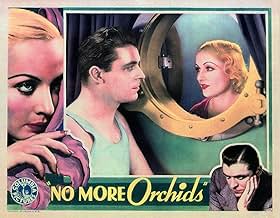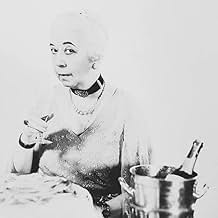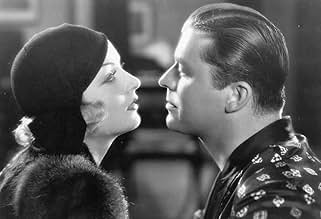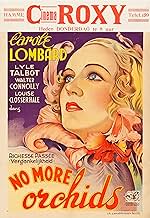Füge eine Handlung in deiner Sprache hinzuAn heiress forced to marry into royalty in order to save her banker father falls in love with another man while on a cruise.An heiress forced to marry into royalty in order to save her banker father falls in love with another man while on a cruise.An heiress forced to marry into royalty in order to save her banker father falls in love with another man while on a cruise.
- Regie
- Drehbuch
- Hauptbesetzung
Sidney Bracey
- Holmes
- (Nicht genannt)
Belle Johnstone
- Housekeeper
- (Nicht genannt)
Edward LeSaint
- Capt. Jeffries
- (Nicht genannt)
Wilfred Lucas
- Banker
- (Nicht genannt)
Charles Hill Mailes
- Merriwell
- (Nicht genannt)
Harold Minjir
- Modiste
- (Nicht genannt)
Broderick O'Farrell
- Benton -- Butler
- (Nicht genannt)
William Worthington
- Cannon
- (Nicht genannt)
Empfohlene Bewertungen
A wonderful cast of supporting character actors enlivens a soap opera about how Carole Lombard falls in love with reverse-snob Lyle Talbot and thwarts the plans of her grandfather -- played by the wonderful C. Aubrey Smith -- to marry his family into European royalty. In the meantime her father -- played by Walter Connolly -- is about to see his bank fail.
It seems apparent that the novel on which this book is based is a lot more complex than this movie. The dialogue is competent, but not great, and people tend to play types rather than individuals. But while this is not a great movie, the wonderful players make it far more enjoyable than anyone would expect it to be. Even Lyle Talbot, usually confined to a simple juvenile lead at his home base of Warner Brothers in this period, is excellent, if a tad declamatory.
It seems apparent that the novel on which this book is based is a lot more complex than this movie. The dialogue is competent, but not great, and people tend to play types rather than individuals. But while this is not a great movie, the wonderful players make it far more enjoyable than anyone would expect it to be. Even Lyle Talbot, usually confined to a simple juvenile lead at his home base of Warner Brothers in this period, is excellent, if a tad declamatory.
Grace Perkins, the author of this story also wrote MY PAST and NIGHT NURSE which were both big impact, big juicy dramas for Warner Bothers around this time as well. This picture has that same strong narrative, a well-crafted sense of direction and an empathy with the charismatic leads. The characters feel like real people, they work well together and develop together. When however you stand back and look at the family to which Carole Lombard's character belongs you have to admit that such a family could only ever exist in fiction, they are a little ridiculous but because they're acted so well with such authenticity, you've abandoned your sense of reality ages ago. One of the reasons it all seems so believable is because for the first half of the film it's a kind of light comedy and the way your mind accepts such something like that is less critical than if it were a tough drama. By the time the film switches from comedy to tragedy (or rather something a bit more dramatic) your mind is fully engaged; a common but still clever little trick.
In essence, it's about a rebellious young heiress (yes, another one!) who rather unsurprisingly falls for the wrong guy (yes, it is that predictable). That's how the film hooks you in, using a familiar story peppered with good witty writing and convincing performances. About half way through it starts to get down to business but still retains that lightness and humour - mainly down to the Granma (played by Louise Closer Hale) who is brilliant...... and so is Walter Connolly (was it in his contract that every father in every Columbia picture of the early 30s had to be played by him?) and so is Carole Lombard (genuinely funny and lovely without doing all that annoying screeching she did in her later films). They're all so good - they're 'proper actors!' And I know I left Lyle Talbot out of that list..... he's not a bad actor he's just incredibly dull. Why would someone as bubbly and vivacious as Carole Lombard's Annie fall for the dullest man in America?
In summary, this is a really worthwhile way to spend an hour and a half if you enjoy a better than average early thirties drama with a splash of comedy thrown in. It's made by Columbia which was not known for its extravagant production budgets but this one feels as classy as anything MGM might have made. It's not got a deep message, it isn't one of those a Warner Brothers/Zanuck movies that will make you angry and want to change the world but it's engaging and good fun.
In essence, it's about a rebellious young heiress (yes, another one!) who rather unsurprisingly falls for the wrong guy (yes, it is that predictable). That's how the film hooks you in, using a familiar story peppered with good witty writing and convincing performances. About half way through it starts to get down to business but still retains that lightness and humour - mainly down to the Granma (played by Louise Closer Hale) who is brilliant...... and so is Walter Connolly (was it in his contract that every father in every Columbia picture of the early 30s had to be played by him?) and so is Carole Lombard (genuinely funny and lovely without doing all that annoying screeching she did in her later films). They're all so good - they're 'proper actors!' And I know I left Lyle Talbot out of that list..... he's not a bad actor he's just incredibly dull. Why would someone as bubbly and vivacious as Carole Lombard's Annie fall for the dullest man in America?
In summary, this is a really worthwhile way to spend an hour and a half if you enjoy a better than average early thirties drama with a splash of comedy thrown in. It's made by Columbia which was not known for its extravagant production budgets but this one feels as classy as anything MGM might have made. It's not got a deep message, it isn't one of those a Warner Brothers/Zanuck movies that will make you angry and want to change the world but it's engaging and good fun.
NO MORE ORCHIDS is just a little programmer movie but it's an incredibly elegant one. Columbia studios in the early 1930's was thought of as something as a poverty row studio yet this film looks as slick and expensive as any potboiler the more uptown MGM or Paramount might have produced.
Carole Lombard stars as a spoiled society girl who is engaged to a prince in a marriage arranged by her controlling grandfather C. Aubrey Smith. On the ocean-liner back to America, she falls in love with white collar worker Lyle Talbot (who in her pampered world qualifies as "penniless") and eventually breaks his cool barrier. Lombard's pal of a dad, Walter Connally, and paternal grandmother Louise Closser Hale are crazy about Talbot but mean old grandpa Smith is not about to let his plans fall through, having seen his own late daughter marry "beneath" her.
Carole Lombard is superb as the frivolous but good-hearted socialite and she surprisingly is matched by Lyle Talbot, one of the era's reliable but usually bland leading men; in this picture, Talbot exhibits a sex appeal seldom tapped in the scores of bread-and-butter pictures he cranked out. Connally is very good in one of his first movie roles as father to a screwball romantic comedy queen (although this picture ventures more toward soap opera "women's picture" despite some nice comedy bits). Talented character player Louise Closser Hale seems a bit miscast, she's a bit too cutesy and lacks the saltiness a May Robson might have brought to the part. Smith essays a rare villainous part in a rather brief but pivotal role. Ruthelma Stevens and the very cute Allen Stevens have the only other somewhat featured parts as two of Lombard's good-time buddies in the society crowd; these small parts are among the larger ones for each of them, as they generally played bits.
Lombard is so strikingly beautiful and assured in her performance here it's hard to believe she was little more than a starlet at the time and not yet a major Hollywood star. She is sensationally photographed, although one scene makes her facial scar from an early car wreck more visible than I've ever seen it in one of her films. NO MORE ORCHIDS is just another Hollywood movie but it moves quickly and smoothly and is well worth your time if you love films from the 1930's.
Carole Lombard stars as a spoiled society girl who is engaged to a prince in a marriage arranged by her controlling grandfather C. Aubrey Smith. On the ocean-liner back to America, she falls in love with white collar worker Lyle Talbot (who in her pampered world qualifies as "penniless") and eventually breaks his cool barrier. Lombard's pal of a dad, Walter Connally, and paternal grandmother Louise Closser Hale are crazy about Talbot but mean old grandpa Smith is not about to let his plans fall through, having seen his own late daughter marry "beneath" her.
Carole Lombard is superb as the frivolous but good-hearted socialite and she surprisingly is matched by Lyle Talbot, one of the era's reliable but usually bland leading men; in this picture, Talbot exhibits a sex appeal seldom tapped in the scores of bread-and-butter pictures he cranked out. Connally is very good in one of his first movie roles as father to a screwball romantic comedy queen (although this picture ventures more toward soap opera "women's picture" despite some nice comedy bits). Talented character player Louise Closser Hale seems a bit miscast, she's a bit too cutesy and lacks the saltiness a May Robson might have brought to the part. Smith essays a rare villainous part in a rather brief but pivotal role. Ruthelma Stevens and the very cute Allen Stevens have the only other somewhat featured parts as two of Lombard's good-time buddies in the society crowd; these small parts are among the larger ones for each of them, as they generally played bits.
Lombard is so strikingly beautiful and assured in her performance here it's hard to believe she was little more than a starlet at the time and not yet a major Hollywood star. She is sensationally photographed, although one scene makes her facial scar from an early car wreck more visible than I've ever seen it in one of her films. NO MORE ORCHIDS is just another Hollywood movie but it moves quickly and smoothly and is well worth your time if you love films from the 1930's.
Rather schizophrenic comedy-drama from post-Prohibition but pre-Hays Code, meaning Carole Lombard gets to strut around in her flimsies, make prurient wisecracks, and be not the least timid about getting what she wants. She's a rich girl with a bumbling banker dad (Walter Connolly, playing virtually the same role as a year later in "It Happened One Night") and an aren't-I-adorable grandma (Louise Closser Hale, trying to be May Robson) who falls for unrich Lyle Talbot (a perfectly OK leading man, who looks a bit like the pre-mustachioed Gable, and has some of the Gable swagger). Why her awful grandpa would insist on her marrying somebody else isn't clear, nor is it clear why the sacrifice at the end makes everything all right. But ignore the plot and enjoy the ribald ripostes, and, especially, Carole looking gorgeous and wriggling around with great vivacity. She has star quality, but beyond that, she's a real actress, and you'll notice how carefully she's building and sustaining a not-always-likable character. Fine work.
"Annie" (Carole Lombard) is the spoilt gal used to delaying ocean liners and swapping her baubles at dinner. It's on that very boat, that she encounters "Tony" (Lyle Talbot) who proves completely impervious to her charms and that just makes her even more determined to get her man. Meantime, she gets home to her family where, unbeknownst to her, her banker father (Walter Connolly) is in a bit of a bind. The family wealth comes from her grandfather (Sir C. Aubrey Smith) and he will only help out if she agrees to marry an European prince. She loves her man, she loves her father, her grandad only loves himself and his dynastic plans. What will she do? I like Lombard. She always managed to exude a strength of character, usually disguised amidst some ditziness and flamboyance and here's there quite a bit of defiance too. Talbot does fine as her onboard foil, Connolly likewise as her out-of-his-depth dad and there are also a punchy series of contributions from Louise Closser Hale as the cocktail-loving grandmother. The ending is really quite fitting, but not in the way you might expect and with some really quite lively writing throughout, it's a good watch.
Wusstest du schon
- WissenswertesWalter Connolly (Bill Holt) and Jameson Thomas (Prince Carlos) would again play a father and his prospective son-in-law in Es geschah in einer Nacht (1934).
- Patzer(at about 6 mins) When Anne Holt is told to take off her dress, she is clearly not wearing a bra. Two edits (six seconds) later, Anne is seemingly struggling to pull her dress below her hips while wearing a bra, which she would not have had time to put on while simultaneously removing her dress.
- VerbindungenReferences The Poor Little Rich Girl (1917)
Top-Auswahl
Melde dich zum Bewerten an und greife auf die Watchlist für personalisierte Empfehlungen zu.
- How long is No More Orchids?Powered by Alexa
Details
- Erscheinungsdatum
- Herkunftsland
- Sprache
- Auch bekannt als
- La consentida
- Drehorte
- Wall Street, Manhattan, New York City, New York, USA(establishing shot for the Banker's Club scene)
- Produktionsfirma
- Weitere beteiligte Unternehmen bei IMDbPro anzeigen
- Laufzeit
- 1 Std. 18 Min.(78 min)
- Farbe
- Seitenverhältnis
- 1.37 : 1
Zu dieser Seite beitragen
Bearbeitung vorschlagen oder fehlenden Inhalt hinzufügen





































